30-Day Study Plan for History Class 11 | History Class 11 - Humanities/Arts PDF Download
| Table of contents |

|
| Week 1: Foundation Building |

|
| Week 2: Deepening Understanding |

|
| Week 3: Advanced Concepts and Practice |

|
| Week 4: Revision and Mock Tests |

|
| Tips for Success |

|
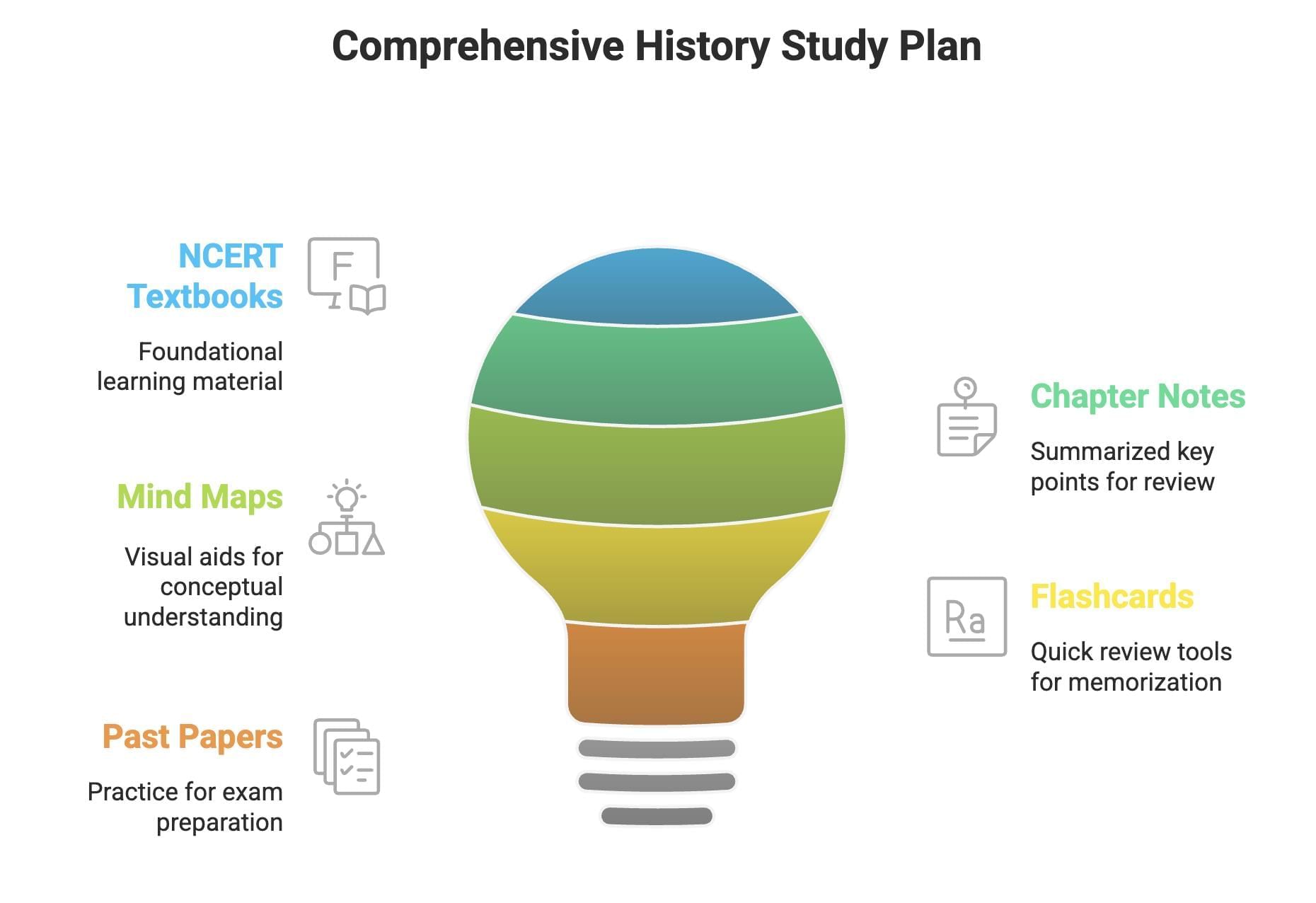
Week 1: Foundation Building
Day 1: Overview and Writing and City Life
Understand the syllabus and start with Mesopotamia, focusing on its writing system and urban life.
- Read: Syllabus: History for Class 11
- Read: NCERT Textbook - Writing and City Life
- Watch: Introduction to Mesopotamia
- Practice: Short Questions with Answers - Writing And City Life
Day 2: Writing and City Life (Continued)
Deepen understanding of Mesopotamia with additional resources and practice.
- Study: Chapter Notes: Writing and City Life
- Watch: Cuneiform Writing System
- Practice: Test: Writing and City Life- 1
Day 3: An Empire Across Three Continents
Explore the Roman Empire, its structure, society, and decline.
- Read: NCERT Textbook - An Empire Across Three Continents
- Study: Chapter Notes: An Empire Across Three Continents
- Watch: The Fall of Roman Empire
- Practice: Test: An Empire Across Three Continents- 1
Day 4: Nomadic Empires
Study the Mongol Empire and its impact on world history.
- Read: NCERT Textbook - Nomadic Empires
- Study: Chapter Notes: Nomadic Empires
- Watch: Rise of Mongol Empire
- Practice: Test: Nomadic Empires- 1
Day 5: The Three Orders
Learn about feudalism and the social structure of medieval Europe.
- Read: NCERT Textbook - The Three Orders
- Study: Chapter Notes: The Three Orders
- Watch: What is Feudalism?
- Practice: Test: The Three Orders
Day 6: Changing Cultural Traditions
Explore the Renaissance and its impact on European culture.
- Read: NCERT Textbook - Changing Cultural Traditions
- Study: Chapter Notes: Changing Cultural Traditions
- Watch: Europe: Florence and Renaissance
- Practice: Test: Changing Cultural Traditions
Day 7: Displacing Indigenous Peoples
Understand the impact of European colonization on indigenous populations in the Americas and Australia.
- Read: NCERT Textbook - Displacing Indigenous Peoples
- Study: Chapter Notes: Displacing Indigenous Peoples
- Watch: Native People and Europe
- Practice: Test: Displacing Indigenous Peoples
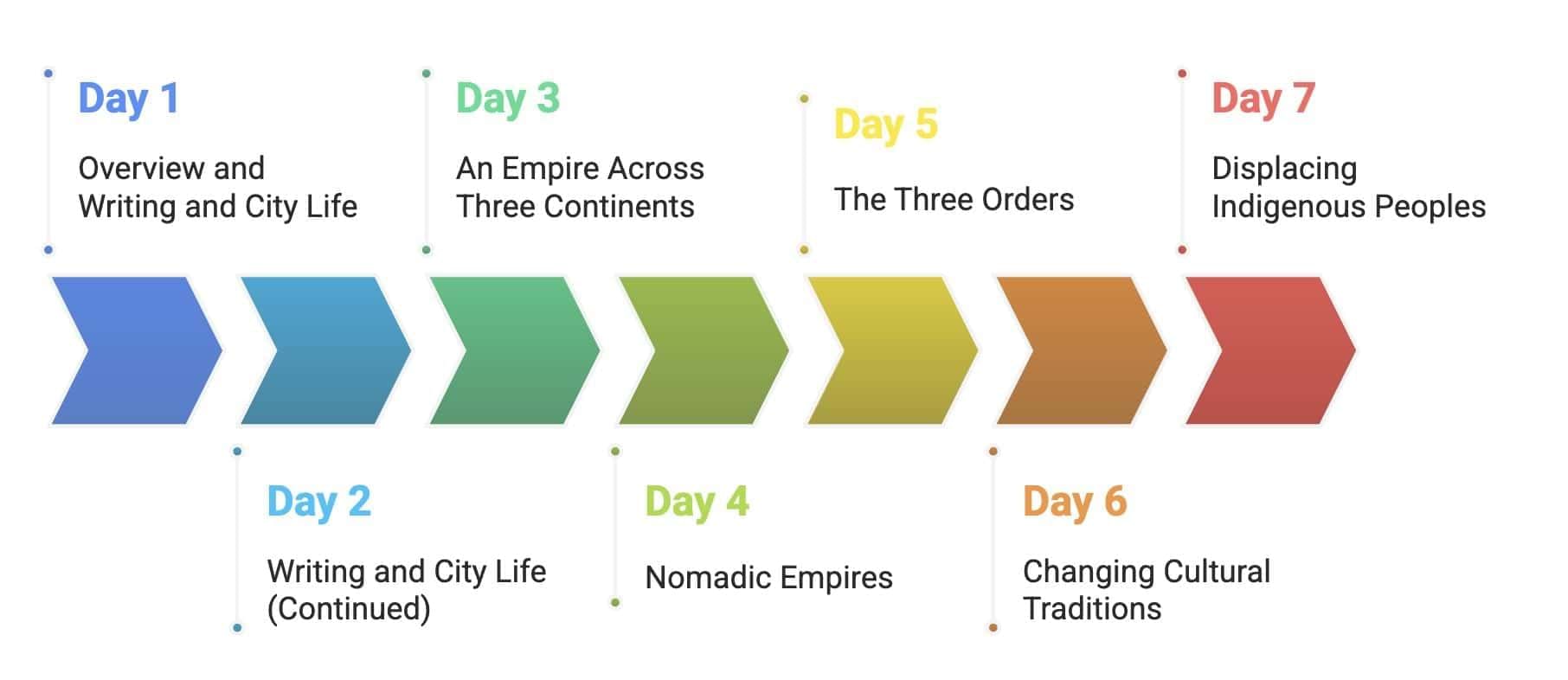
Week 2: Deepening Understanding
Day 8: Paths to Modernisation
Study the modernization processes in Japan and China, focusing on the Meiji Restoration.
- Read: NCERT Textbook - Paths to Modernisation
- Study: Chapter Notes: Paths to Modernisation
- Watch: Meiji Restoration
- Practice: Test: Paths To Modernisation
Day 9: From the Beginning of Time (Optional - Old Syllabus)
Explore human evolution and early societies (if included in your syllabus).
- Read: Chapter Notes: From the Beginning of Time (Old Syllabus)
- Watch: The Story of Human Evolution
- Practice: Test: From the Beginning of Time- 1 (Old Syllabus)
Day 10: Writing and City Life - Advanced
Revise Mesopotamia and practice advanced questions.
- Revise: Mind Map: Writing and City Life
- Practice: Important Questions: Writing & City Life
- Practice: Passage Based Questions: Writing and City Life
Day 11: An Empire Across Three Continents - Advanced
Deepen understanding of the Roman Empire and practice source-based questions.
- Revise: Mind Map: An Empire Across Three Continents
- Practice: Important Questions: An Empire Across Three Continents
- Practice: Test: An Empire Across Three Continents- Assertion-Reason & Source Based Questions - 1
Day 12: Nomadic Empires - Advanced
Revise the Mongol Empire and practice long questions.
- Revise: Mind Map: Nomadic Empires
- Practice: Long Questions with Answers - Nomadic Empires
- Practice: Test: Nomadic Empires- 2
Day 13: The Three Orders - Advanced
Revise feudalism and practice source-based questions.
- Revise: Mind Map: The Three Orders
- Practice: Important Questions: The Three Orders
- Practice: Test: The Three Orders- Source Based Type Questions
Day 14: Changing Cultural Traditions - Advanced
Deepen understanding of the Renaissance and practice passage-based questions.
- Revise: Mind Map: Changing Cultural Traditions
- Practice: Important Questions: Changing Cultural Traditions
- Practice: Passage Based Questions: An Empire Across Three Continents
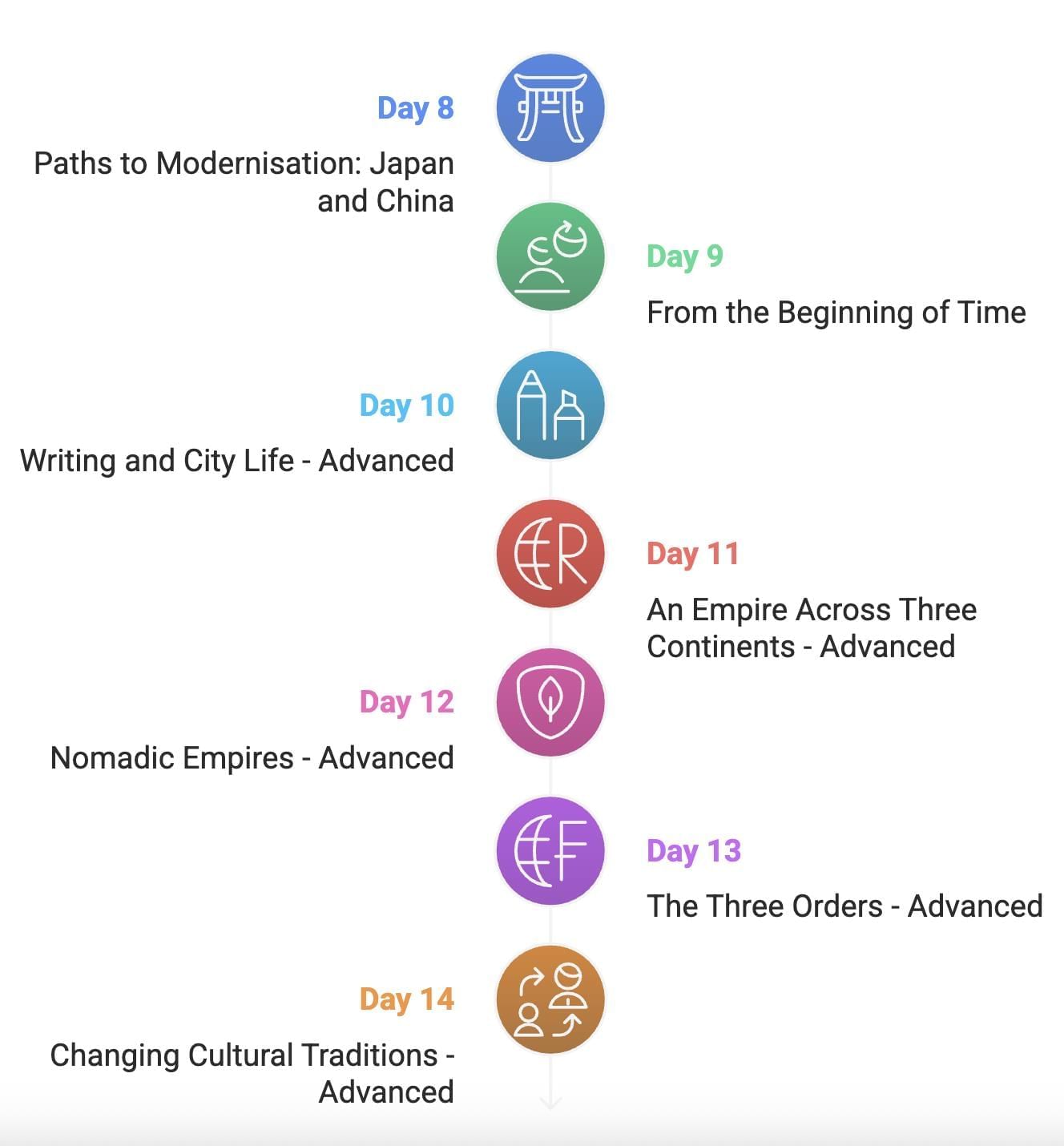
Week 3: Advanced Concepts and Practice
Day 15: Displacing Indigenous Peoples - Advanced
Revise the impact of colonization and practice source-based questions.
- Revise: Mind Map: Displacing Indigenous Peoples
- Practice: Important Questions: Displacing Indigenous Peoples
- Practice: Test: Displacing Indigenous Peoples- Source Based Type Questions
Day 16: Paths to Modernisation - Advanced
Revise modernization in Japan and China and practice long questions.
- Revise: Mind Map: Paths to Modernisation
- Practice: Long Questions with Answers - Paths to Modernisation
- Practice: Test: Paths to Modernization- Assertion & Source Based Type Questions
Day 17: From the Beginning of Time - Advanced (Optional)
Revise human evolution and practice passage-based questions (if included in your syllabus).
- Revise: Flashcards: From the Beginning of Time
- Practice: Important Questions: From the Beginning of Time
- Practice: Passage Based Questions: From the Beginning of Time
Day 18: Map Work
Focus on map-based questions across all themes.
- Study: Writing & City Life
- Practice: Map Based Questions: Writing and City Life
- Practice: Map Based Questions: The Three Orders
Day 19: Source-Based Questions
Practice source-based questions for all themes.
- Practice: Test: Writing And City Life- Source Based Type Questions
- Practice: Test: Changing Cultural Traditions- Source Based Type Questions
Day 20: Previous Year Questions (PYQs)
Solve previous year questions to understand exam patterns.
- Practice: CBSE Class 11 History Sample Paper 2023 - 1
- Practice: CBSE Class 11 History Sample Paper 2023 - 2
Day 21: Revision with Flashcards
Use flashcards to revise key concepts across all themes.
- Revise: Flashcards: Writing and City Life
- Revise: Flashcards: An Empire Across Three Continents
- Revise: Flashcards: Paths to Modernisation
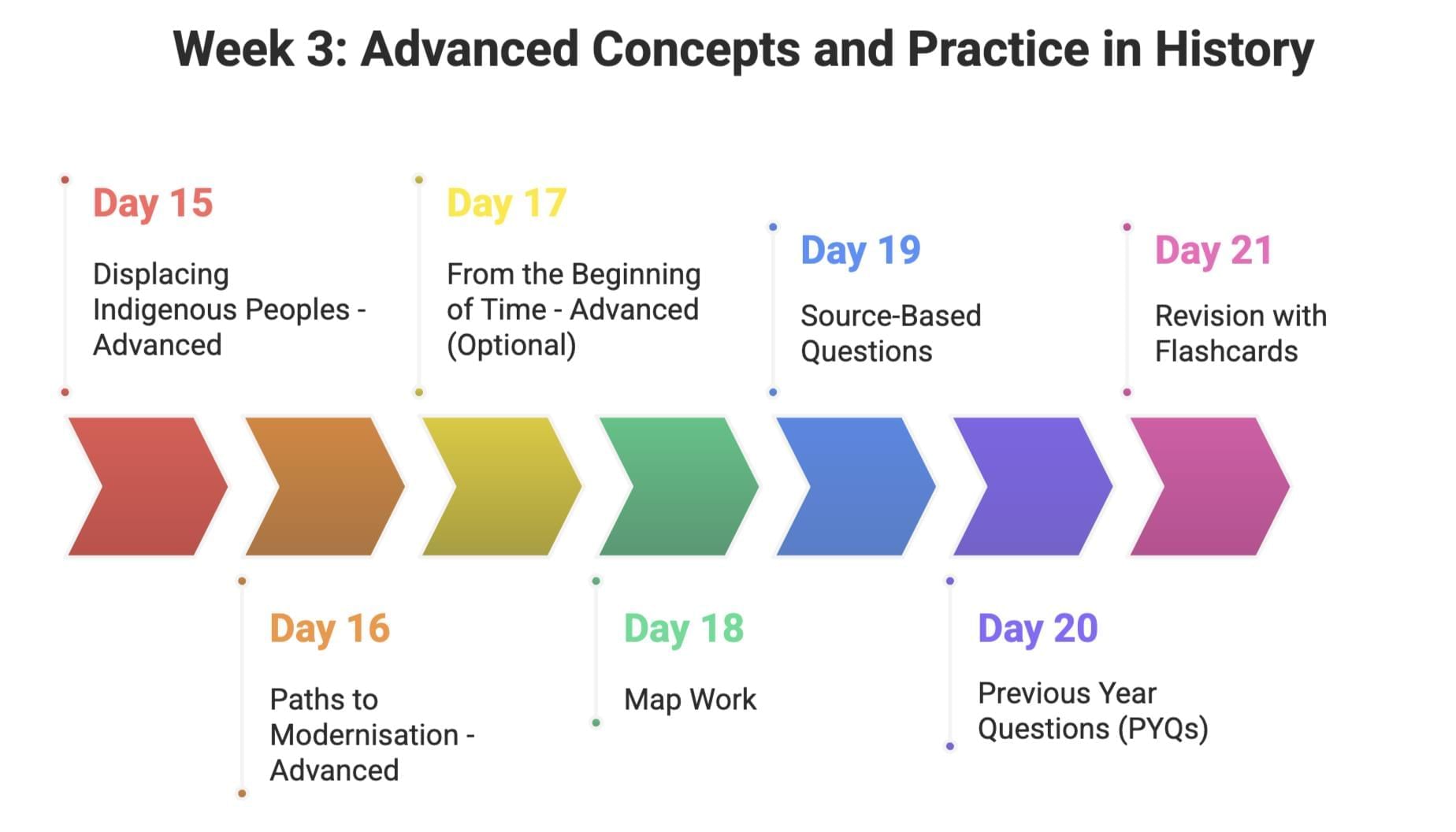
Week 4: Revision and Mock Tests
Day 22: Revise Writing and City Life and An Empire Across Three Continents
Review Mesopotamia and the Roman Empire using revision notes and flashcards.
- Revise: Revision Notes - Writing and City Life
- Revise: Revision Notes - An Empire Across Three Continents
- Practice: NCERT Solutions: Writing and City Life History
Day 23: Revise Nomadic Empires and The Three Orders
Review the Mongol Empire and feudalism in Europe.
- Revise: Revision Notes - Nomadic Empires
- Revise: Revision Notes - The Three Orders
- Practice: NCERT Solutions - The Three Orders
Day 24: Revise Changing Cultural Traditions and Displacing Indigenous Peoples
Review the Renaissance and the impact of colonization.
- Revise: Revision Notes - Changing Cultural Traditions
- Revise: Revision Notes - Displacing Indigenous Peoples
- Practice: NCERT Solutions - Displacing Indigenous Peoples
Day 25: Revise Paths to Modernisation and Optional Chapter
Review modernization in East Asia and human evolution (if applicable).
- Revise: Revision Notes - Paths to Modernisation
- Revise (Optional): Revision Notes - From the Beginning of Time (Old Syllabus)
- Practice: NCERT Solutions - Paths to Modernisation
Day 26: Map Work and Source-Based Questions
Practice map-based and source-based questions across all themes.
- Practice: Map Based Questions: Displacing Indigenous Peoples
- Practice: Map Based Questions: Paths to Modernisation
- Practice: Test: Changing Cultural Traditions- Source Based Type Questions
Day 27: Full-Length Mock Test
Take a full-length mock test to simulate exam conditions.
- Practice: CBSE Class 11 History Sample Paper 2023 - 1
- Practice: CBSE Class 11 History Sample Paper 2023 - 3
Day 28: Revise Weak Areas
Focus on topics where you struggled in the mock test, using flashcards and NCERT solutions.
- Revise: Flashcards: The Three Orders
- Revise: Flashcards: Displacing Indigenous Peoples
- Practice: Solve 10-15 questions from weak areas.
Day 29: Final Revision
Review all themes using mind maps and cheat sheets for quick recall.
- Revise: Cheat Sheet: Writing and City Life
- Revise: Cheat Sheet: Changing Cultural Traditions
- Practice: Mind Map: Paths to Modernisation
Day 30: Final Mock Test and Relaxation
Take another full-length mock test and relax to build confidence for the exam.
- Practice: CBSE Class 11 History Sample Paper 2023 - 4
- Review: Analyse performance and ensure readiness.
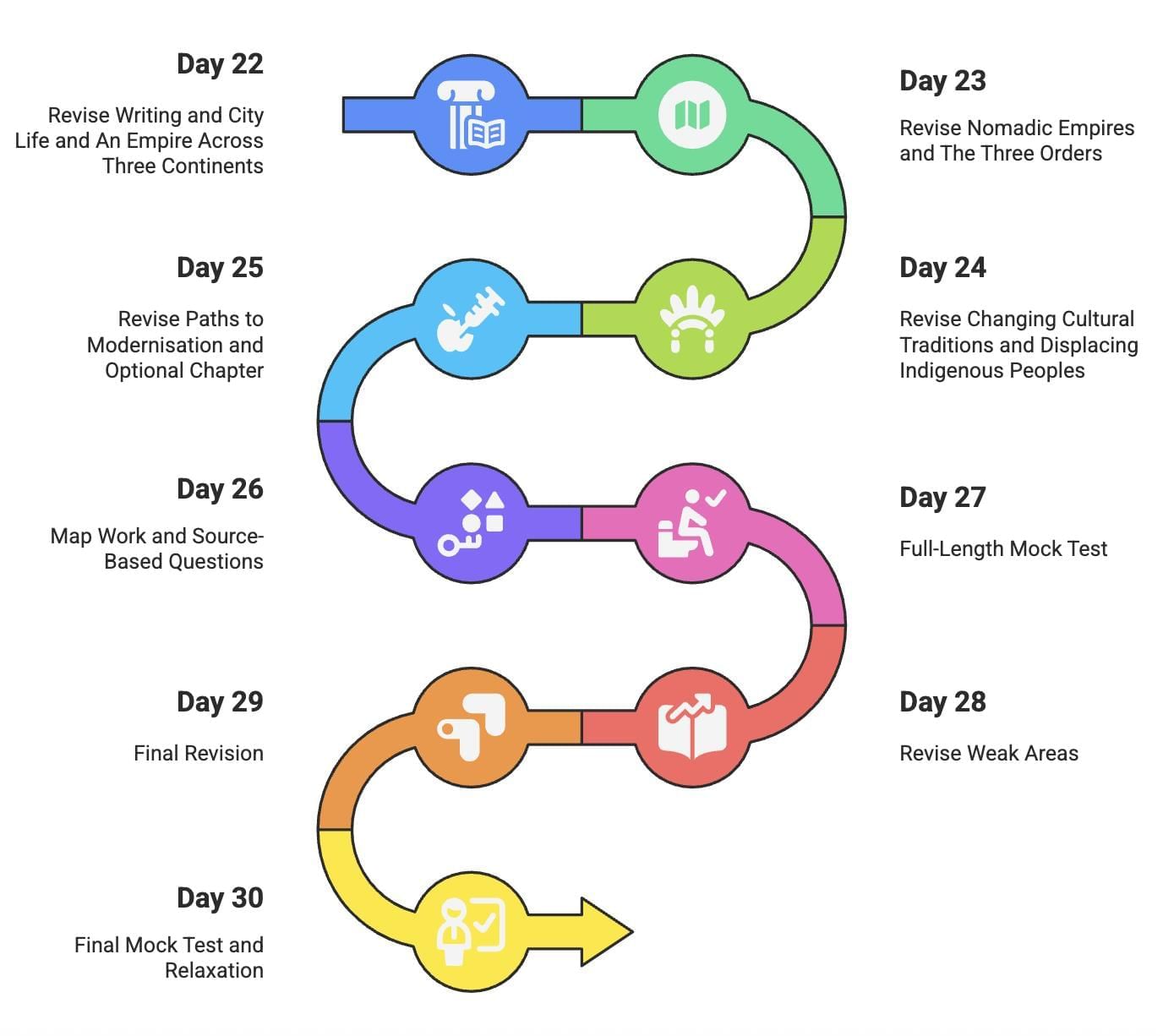
Tips for Success
- Read NCERT Thoroughly: NCERT textbooks are the core of the syllabus. Ensure you understand all concepts before using additional resources.
- Practice Diverse Questions: Solve source-based, passage-based, and map-based questions to prepare for all question types.
- Use Visual Aids: Mind maps, flashcards, and cheat sheets aid quick revision of key concepts.
- Focus on Map Work: Practice map-based questions regularly, as they carry significant marks.
- Time Management: Allocate specific times for reading, practising, and revising to stay disciplined.
- Analyse Past Papers: Review CBSE sample papers to understand question patterns and improve answer writing.
- Stay Relaxed: Take short breaks to avoid burnout and maintain a positive mindset.
|
27 videos|157 docs|27 tests
|
FAQs on 30-Day Study Plan for History Class 11 - History Class 11 - Humanities/Arts
| 1. What are the key topics covered in the 30-day study plan for History Class 11 Humanities/Arts? |  |
| 2. How can I effectively utilize the Revision and Mock Tests week for my exam preparation? |  |
| 3. What strategies can I implement during the Foundation Building week to enhance my understanding of history? |  |
| 4. Why is it important to deepen understanding in Week 2 of the study plan? |  |
| 5. How can I assess my progress during the Advanced Concepts and Practice week? |  |



















